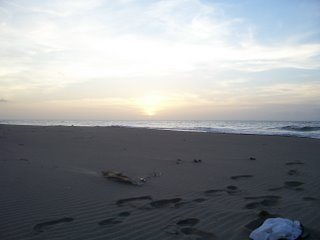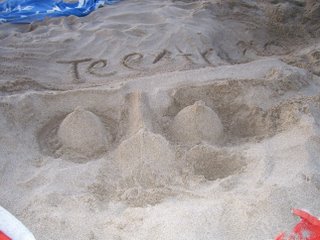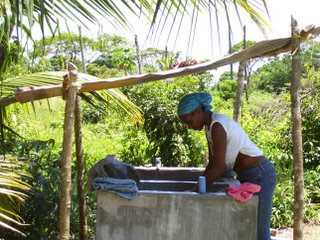This is a piece that will be published in a women of color zine here in Austin. If you have comments feel free to share them. Being in Central America gave me a lot of time to reflect on this past year and the various issues that are important to me. Each day I took 30 min. to an hour to stop and process the day's events and my own thoughts. It felt really good to develop a writing practice/routine and I found that it helped me to make some breakthroughs I'd been trying to make all year.
In short, this trip was good for me, even if it was a little tough.
Enjoy...
---------------------------------
Bodies At War
For Ortralla.
Even tonight and I need to take a walk and clear my head about this poem about why I can't go out without changing my clothes my shoes my body posture my gender identity my age my status as a woman alone in the evening/ alone on the streets/alone not being the point/the point being that I can't do what I want to do with my own body because I am the wrong sex the wrong age the wrong skin
“Poem About My Rights,” by June Jordan
20 de julio 2006
I learned again tonight what it means to move in the world inside a black female body. It means not being able to defend yourself or anyone else from unexpected violence. It means being forced to make impossible choices between what is fair and what is safe. It means trying to help others and sometimes having to walk away and leave others to their fate in order to protect your own.
As a righteous Black feminist it has always been a great source of pride for me that I don’t tolerate violence against women of any kind. In March of this year, I helped to create Feminists of Color United (FoCU), to protest the appearance of R. Kelly at the University of Texas at Austin. It seemed unconscionable to us that a man who is currently on trial for 14 counts of child pornography (after he filmed himself urinating on a 14-year-old girl) should be invited to perform at the University.[1] I’ve written about my experiences of sexual abuse and work with young women of color to empower them to recognize relationship violence and develop the confidence to walk away from it. Still, violence, as pervasive as I know it to be, continues to alarm and frighten me when I confront it in my political/intellectual/personal life. As a researcher, I do work with Black women activists participating in various political struggles on the South Atlantic Coast of Nicaragua. I’ve been coming here since 2004 and every time that I return it is a reminder that the struggle to protect our bodies and spirits from life-threatening patriarchal violence is a global struggle. And even for a self-identified feminist it is a sobering reality coming to terms with this fact.
Angie, a feminist activist and close friend of mine, was hit in the face tonight at a popular club here in Bluefields, Nicaragua. It wasn’t her fault – the man was a stranger. He was angry with his girlfriend, who was sitting behind us. They were quarrelling and when he reached over the bar to hit her, she ducked, and he ended up popping Angie instead. I quickly tracked down the waiter to ask for the cuenta so we could get out of there. The right side of her face was beginning to swell. We find out later that this man attacked his wife because she had gone out with two women friends who are open lesbians. Afraid that his wife is turning into a tortillera[2], he decides it is time to exercise his phallic power and put her back into her place. My mind is completed stunned at the interplay of gender, sexuality, and power dynamics in this situation.
The woman, a young Mestiza, was petrified, balled up against the wall, breaking down into tears. I ask her, ¿Puede quedar con una amiga esta noche?[3] She replies that she can and before I can begin to suggest that she turn this chump over to the cops she collapses into my arms, sobbing as I console her in frightened, wobbly Spanish. She says that she will stay with a friend tonight and I warn her to take care of herself as Angie and I prepare to leave.
But I am still afraid for her. For all of us.
On our way out of the club, Angie confronts the man who accidentally assaulted her. He apologizes, stating that he had no intention to hurt her. This admission provides little comfort – of course, he didn’t mean to hurt Angie, he doesn’t know her. But this can hardly be considered an accident, since he had every intention of violently beating his wife in the middle of a crowded nightclub. He seems honestly confused by Angie’s anger, and she is violently lashing out, slapping him across the face several times. I have no confusion as to the source of her anger and I feel both ashamed and relieved for breaking them up. He deserved to be slapped, no question about it, but I find myself wondering would this small victory have been worth it if he beat both of us up, or had suddenly pulled out a knife? I hate being compelled to make such choices – survival choices, I call them. During the taxi ride home, I think to myself, it could have been worse.
Small comfort.
We leave the club without the girl’s name, her assailant/husband’s name, or having him removed from the club. The slapping may have made my friend feel better, but it won’t stop him from beating the shit out of his wife when she is finally forced to come home. What will happen to her? Could I have done something to keep her safe, instead of fearing for myself and fleeing the club? My conscience offers little consolation.
At home I prepare water, Motrin IB, and a ziplock bag full of ice. I hope that this will help the lump on the side of my friend’s face from turning into an ugly bruise that she will have to explain to friends, co-workers, and family as though it were her fault. She asks me what she will tell her son. “The truth,” I reply softly.
But who can say with certainty what the hell that means?
At home, we sink wearily into rocking chairs, she presses the ziplock bag to her eye, wincing from the cold and the throbbing sensation in her upper cheek. We watch the news. A man in the U.S., enraged by his wife’s decision to leave him, enters her job carrying a Sprite bottle full of gasoline. He douses her in it, reaches into his pocket for a lighter, and sets her fire in her workplace. CNN shows before and after pictures. She is a beautiful young Black woman, whose only mistake was deciding to leave a violent partner and escape an abusive situation. She survives, but there are only colorless patches where cinnamon flesh, thick hair and eyebrows used to be. She survives, but who among us can say how she is surviving? And what of the psychic wounds, the nightmares, the loss of any sense of security, the perpetual fear of violence – will she survive this?
A lesson, hard learned, on what it means to walk through this world in a body that is rendered vulnerable by its sex/gender, race, age. I think of my politics and how they might help to transform this world into one where we don’t have to struggle to stay alive and whole simply by virtue of being who we are. I recall joking with a male friend, a rather tall and strong male friend, as he fumbled with his keys outside of his apartment late one night that he obviously was not a woman. Eyes blank and not quite understanding, he replies, “What do you mean?” I mean, jumping out of your car after the sun sets and having your house key poised and ready to unlock your apartment because the longer you spend fiddling in your purse looking for keys, the greater chance you stand of being assaulted because you weren’t paying attention and didn’t notice the creep watching you from a few feet away.
I mean, for all the times my grandmother warned me to look under and inside my car before getting in because you never know if someone might be waiting for you.
I mean, for all the times I decided not to take the bus to school, wear a certain dress or pair of shorts, or walk alone in my neighborhood, because catcalls from speeding cars and winos who followed me down Manor Road with sex-starved eyes made me feel vulnerable in my own community.
I mean, for the 21-year-old woman who was found by her parents, in pieces, in a bathtub in West Campus after going out on a “date” with her friend.
I mean, for Ortralla Moseley, 15, whose boyfriend stabbed her to death at 10:30 in the morning during passing period in the middle of a crowded hallway at Reagan High School. Another girlfriend had been forced to transfer schools after this young man’s aggression and jealousy caused her and her parents to fear for her life. Ortralla, citing these same reasons, had broken up with him the day before he murdered her. No one at school, however, seemed to pay much attention to his history of violence.
I mean, for Charlotte Jones, 21, who ran track with me at C.E. Ellison High School and could finish the 100-meter dash in 12 seconds flat. After graduation, she worked at Wal-Mart as a cashier. Her husband, a low-ranking Army soldier, shot her in the face, then shot and murdered their one-year-old daughter, before turning the gun on himself.
I mean, never knowing whether a walk outside, or going out for a quick beer, or checking your mail will mean you can expect to be the victim of sudden violence.
I have no answers, only the clear realization that occupying this body means being in a constant state of war. The only way I can hope to survive is by being prepared, on multiple levels (politically, physically, spiritually, and emotionally) to fight and defend it.
21 de julio 2006
This morning Angie’s right eye is swollen shut. I don’t think either of us will be recovering any time soon.
We clean house, hang wet sheets on clothesline, listen to radio programs. Gingerly press ice onto the ugly bruise. We go on.
We survive.
[1] See WanderLust at www.wanderlustwarrior.blogspot.com for additional information on the R. Kelly protest and the FoCU manifesto written in response to his appearance.
[2] In many Latin American countries, lesbianism is seen as less threatening than male homosexuality because, presumably, there is no penetration involved. It is commonly joked that all women can do is ‘make tortillas,’ that is, rub their vaginas together. I’ve considered disabusing people of the notion that all lesbians do is ‘make tortillas,’ but have not as yet, done so.
[3] Can you stay with a (female) friend tonight?
Wednesday, August 02, 2006
 Back in the States, ya'll and feeling a little worn out. The South takes a lot out of the girl. Here are a few pics from my travels in Honduras and Nicaragua. Enjoy...
Back in the States, ya'll and feeling a little worn out. The South takes a lot out of the girl. Here are a few pics from my travels in Honduras and Nicaragua. Enjoy...Here's a view of the beach from Cusuna, the largest community in Territorio Garifuna. Not to sound too hokey or silly, but I found it very calming and reassuring to be so close to the water. Being in the communities made me realize more clearly the power of the environment and how critical it is that we protect it.

I decided to experiment with temporary art structures on the beach...what happens to the mind of an anthropologist after a few weeks in the field without receiving some much needed lovin'...
 So you thought a colored girl from the U.S. couldn't hang in the Global South? Think again, kids. In the communities of the Territorio Garifuna there is no electricity, running water within people's homes, or the comforts we take for granted at home like washing machines and dryers. So you adjust and find that you can manage just fine without them.
So you thought a colored girl from the U.S. couldn't hang in the Global South? Think again, kids. In the communities of the Territorio Garifuna there is no electricity, running water within people's homes, or the comforts we take for granted at home like washing machines and dryers. So you adjust and find that you can manage just fine without them.
Subscribe to:
Comments (Atom)

